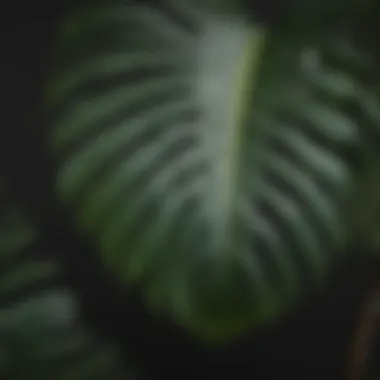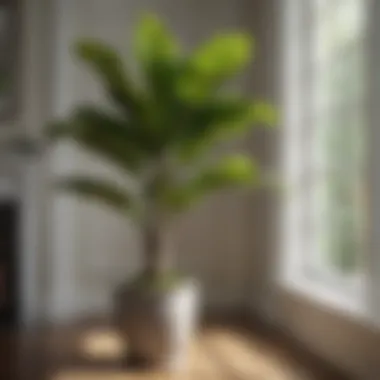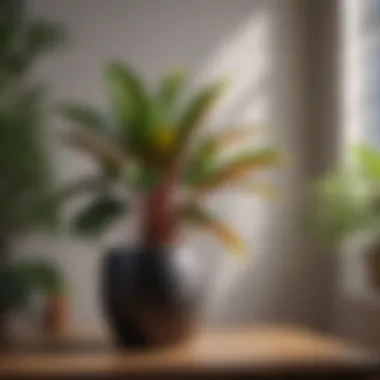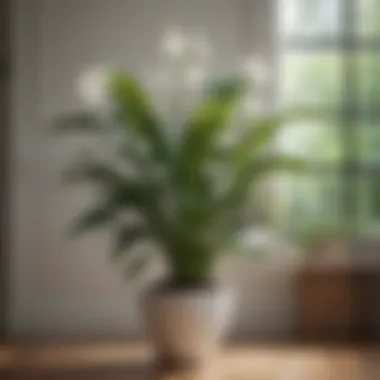Unveiling the Splendor of Majestic Indoor Houseplants: A Guide to Enhancing Your Living Space


Interior Design Tips
Large indoor houseplants not only serve as statement pieces but also play a vital role in enhancing the aesthetics of interior spaces. Trendy design ideas involve incorporating these lush greens into the overall decor scheme, utilizing their vibrant foliage to add depth and texture to the room. When considering color schemes and combinations, it is essential to select plants that complement the existing palette while introducing a refreshing touch of nature. Furniture arrangement techniques center around strategically placing these large houseplants to create focal points and optimize visual appeal, elevating the ambiance of any indoor setting.
Introduction to Large Indoor Houseplants
In the realm of interior design and botanical aesthetics, large indoor houseplants play a pivotal role in elevating the ambiance of living spaces. These botanical giants not only serve as ornamental additions but also offer a plethora of benefits ranging from enhancing indoor air quality to adding a touch of tranquility within homes. By incorporating large indoor plants, individuals can bring a slice of nature indoors, fostering a soothing environment amidst the hustle and bustle of modern living.
Benefits of Large Indoor Houseplants
Enhancing Indoor Air Quality
The significance of large indoor houseplants in enriching air quality cannot be overstated. These botanical wonders act as natural air purifiers, filtering out toxins and pollutants while producing fresh oxygen. By absorbing harmful gases and volatile organic compounds, indoor plants contribute to a healthier and cleaner indoor environment, promoting overall well-being and respiratory health.
Creating a Tranquil Environment
Large indoor houseplants possess the remarkable ability to create a serene and harmonious atmosphere within living spaces. Their lush foliage and verdant presence evoke a sense of calmness and relaxation, effectively reducing stress levels and enhancing mental clarity. The visual appeal of these plants fosters a connection with nature, promoting a peaceful sanctuary for individuals to unwind and rejuvenate amidst the comforts of home.
Adding Aesthetic Value to Living Spaces
Apart from their functional benefits, large indoor houseplants serve as striking decorative elements that uplift the visual appeal of any room. Whether placed as statement pieces or integrated into green oasis designs, these plants infuse a sense of sophistication and elegance into interior settings. With a diverse range of shapes, sizes, and textures, large indoor houseplants offer endless possibilities for enhancing the aesthetic charm of living spaces.


Styling and Decorating with Large Indoor Houseplants
Large indoor houseplants are not just green additions to a space; they are intricately woven into the art of styling and decorating interior environments. The fusion of nature with design brings about a harmonious balance that transforms living spaces into vibrant sanctuaries. By strategically placing these botanical wonders, one can elevate the aesthetic appeal of a room while infused with the tranquility that only plants can offer. Understanding the importance of styling and decorating with large indoor houseplants entails acknowledging their capacity to soften architectural lines and add organic textures, creating visually appealing focal points that invite a sense of peace and renewal.
Incorporating Large Plants into Interior Design
Statement Plant Display
A statement plant display serves as a bold centerpiece within a room, commanding attention and setting the tone for the entire space. These visual marvels not only enhance the visual appeal of a room but also purify the air and contribute to a healthier indoor environment. The striking presence of a statement plant lends a touch of sophistication and drama, making it a popular choice for those seeking to make a stylish impact while benefiting from the lush greenery they provide. However, one must consider the space needed to accommodate such grandeur, as well as the maintenance requirements that come with showcasing such a prominent botanical specimen. Balancing the size of the plant with the available space is crucial to ensure a harmonious integration.
Green Oasis in Living Areas
The concept of a green oasis in living areas revolves around creating a lush haven that offers a retreat from the hustle and bustle of daily life. By infusing large indoor houseplants into living spaces, one can cultivate an atmosphere of relaxation and rejuvenation. These green havens not only add visual interest but also improve the air quality, fostering a sense of tranquility and well-being. The key characteristic of a green oasis lies in its ability to transform an ordinary room into a serene sanctuary, where plant life thrives, and inhabitants find solace in the beauty of nature. While the advantages of creating a green oasis are abundant, one must be mindful of selecting plants that align with the available light conditions and space constraints to ensure their flourishing.
Vertical Garden Installations
Vertical garden installations offer a creative solution for incorporating large indoor houseplants into limited space environments. By utilizing vertical space, these installations provide a unique way to introduce greenery without sacrificing floor space. The key characteristic of vertical gardens lies in their ability to infuse bare walls with life, creating a refreshing ambiance that revitalizes the room's atmosphere. This innovative approach not only maximizes space but also serves as a versatile design element, allowing for endless customization possibilities. While the advantages of vertical garden installations are manifold, considerations such as proper watering systems, plant selection, and structural support are vital to ensure the longevity and health of such installations.
Complementing Different Decor Styles with Large Indoor Plants
Minimalist and Modern Interiors


In minimalist and modern interiors, large indoor plants serve as striking focal points that complement the sleek and clean lines typical of this design style. Their sculptural shapes and lush foliage add a natural touch to the curated simplicity of minimalist spaces, infusing warmth and life into an otherwise streamlined environment. The key characteristic of incorporating large indoor plants into minimalist and modern interiors lies in their ability to harmonize with the space's aesthetic while providing a refreshing contrast to the contemporary design elements. The advantages of this pairing include enhanced visual interest, improved air quality, and a sense of connection to nature within a modern setting.
Bohemian and Eclectic Spaces
In bohemian and eclectic spaces, large indoor plants act as free-spirited accent pieces that contribute to the eclectic charm and vibrancy of such environments. Their untamed beauty and diverse foliage patterns seamlessly blend with the mix-and-match aesthetics characteristic of bohemian decor, adding a touch of whimsy and organic flair. The key characteristic of incorporating large indoor plants into bohemian and eclectic spaces lies in their ability to evoke a sense of bohemian escapism and artistic expression, infusing the space with a carefree and rejuvenating energy. While the advantages of this decor choice include a bohemian spirit and personalized touch, careful consideration of plant care and placement is essential to maintain the eclectic harmony.
Traditional and Classic Decor Themes
In traditional and classic decor themes, large indoor plants serve as timeless elements that bring a sense of grandeur and elegance to the space. Their gracious presence and enduring beauty complement the ornate details and sophisticated elegance typical of traditional decor, creating a sense of opulence and refinement. The key characteristic of incorporating large indoor plants into traditional and classic themes lies in their ability to add a touch of nature's splendor to richly adorned settings, enhancing the room's overall ambiance. The advantages of this pairing include a sense of heritage and sophistication, as well as the opportunity to create a stately and inviting atmosphere that encapsulates the essence of traditional charm.
Advanced Techniques for Large Indoor Houseplant Enthusiasts
In this section, we delve into the advanced techniques crucial for those passionate about large indoor houseplants. As gardening enthusiasts seek to expand their skills, understanding these techniques becomes essential for fostering healthy and thriving indoor greenery. From propagation methods to troubleshooting common issues, these advanced techniques offer insight into the intricate world of plant care.
Propagation Methods for Large Indoor Plants
Seed Propagation
Seed propagation is a fundamental aspect of expanding your indoor plant collection. This method involves growing plants from seeds, providing enthusiasts with the opportunity to witness the complete growth cycle of their botanical companions. Seed propagation offers a cost-effective and fulfilling way to nurture new plants from scratch. While it requires patience and precision, the satisfaction of seeing a tiny seed evolve into a flourishing plant is unparalleled in the realm of indoor gardening.
Cutting Propagation


Cutting propagation is a popular technique among indoor gardeners looking to create genetic replicas of their favorite plants. By taking cuttings from a parent plant and coaxing them to develop roots, enthusiasts can effectively clone their cherished botanical specimens. This method enables individuals to preserve plant characteristics that they admire, ensuring continuity in their indoor garden aesthetics. While cutting propagation requires vigilance in monitoring root growth, the ability to replicate favored plants adds a personal touch to one's indoor oasis.
Division Propagation
Division propagation is a method commonly used for plants with multiple stems or offshoots. By dividing the plant into sections and re-potting them separately, gardeners can promote healthier growth and extend the plant's presence in different areas of their home. This technique not only aids in managing plant size but also encourages root regeneration and overall vigor. While division propagation may necessitate attentive handling to prevent shock to the plant, the ability to expand one's greenery through this method offers a dynamic approach to indoor plant care.
Troubleshooting Common Issues in Large Indoor Houseplants
Pest Infestations
Dealing with pest infestations is a challenge that many indoor plant enthusiasts face. From tiny aphids to pesky spider mites, these unwelcome guests can wreak havoc on a plant's health if left unchecked. Identifying early signs of infestation, such as distorted leaves or webbing, is crucial for prompt intervention. Implementing natural remedies or targeted treatments can help eradicate pests while safeguarding the overall well-being of indoor plants.
Yellowing Leaves
Yellowing leaves are often a distress signal from plants, indicating issues with watering, nutrition, or environmental conditions. Understanding the underlying causes of leaf discoloration, such as overwatering or nutrient deficiencies, is imperative for restoring plant vitality. Adjusting watering schedules, ensuring proper light exposure, and providing balanced fertilization can aid in rejuvenating plants with yellowing leaves, promoting lush foliage and vibrant growth.
Over-Watering Symptoms
Over-watering is a common pitfall for indoor gardeners, leading to root rot and diminished plant health. Recognizing the signs of over-watering, such as wilting, yellowing, or soft, mushy stems, is crucial for preventing waterlogged conditions. Implementing well-draining soil mixes, establishing watering routines based on plant needs, and incorporating proper drainage mechanisms are key strategies for mitigating over-watering risks. By maintaining balanced moisture levels, enthusiasts can foster thriving indoor plants with robust root systems and lush greenery.
Conclusion
In the realm of large indoor houseplants, the concluding section serves as a pivotal element in synthesizing the myriad aspects discussed throughout this comprehensive guide. Delving deep into the nuances of cultivating these botanical beauties, the conclusion not only wraps up the key points elucidated but also offers a profound reflection on the significance of incorporating large indoor plants into living spaces.
One crucial aspect underscored in this conclusion is the transformative impact that large indoor houseplants can have on the ambiance and aesthetics of a home. By introducing lush greenery into interior settings, homeowners can create a serene and rejuvenating environment that resonates with nature's beauty. The interplay between these botanical wonders and the decor of a space elevates the overall visual appeal, adding a touch of sophistication and freshness to any room.
Moreover, the conclusion sheds light on the therapeutic benefits of nurturing large indoor houseplants. Beyond mere decoration, these greens serve as natural air purifiers, promoting better indoor air quality and fostering a healthier living environment. The presence of these plants not only enhances the physical wellness of residents but also contributes to a calmer and more tranquil atmosphere, ideal for relaxation and unwinding after a long day.
Additionally, the conclusion emphasizes the importance of selecting the right plant varieties and placing them strategically within a home. By considering factors such as natural light exposure, temperature conditions, and space constraints, individuals can ensure the optimal growth and well-being of their botanical companions. This tailored approach to plant care underscores the commitment required to nurture and maintain large indoor houseplants effectively.







